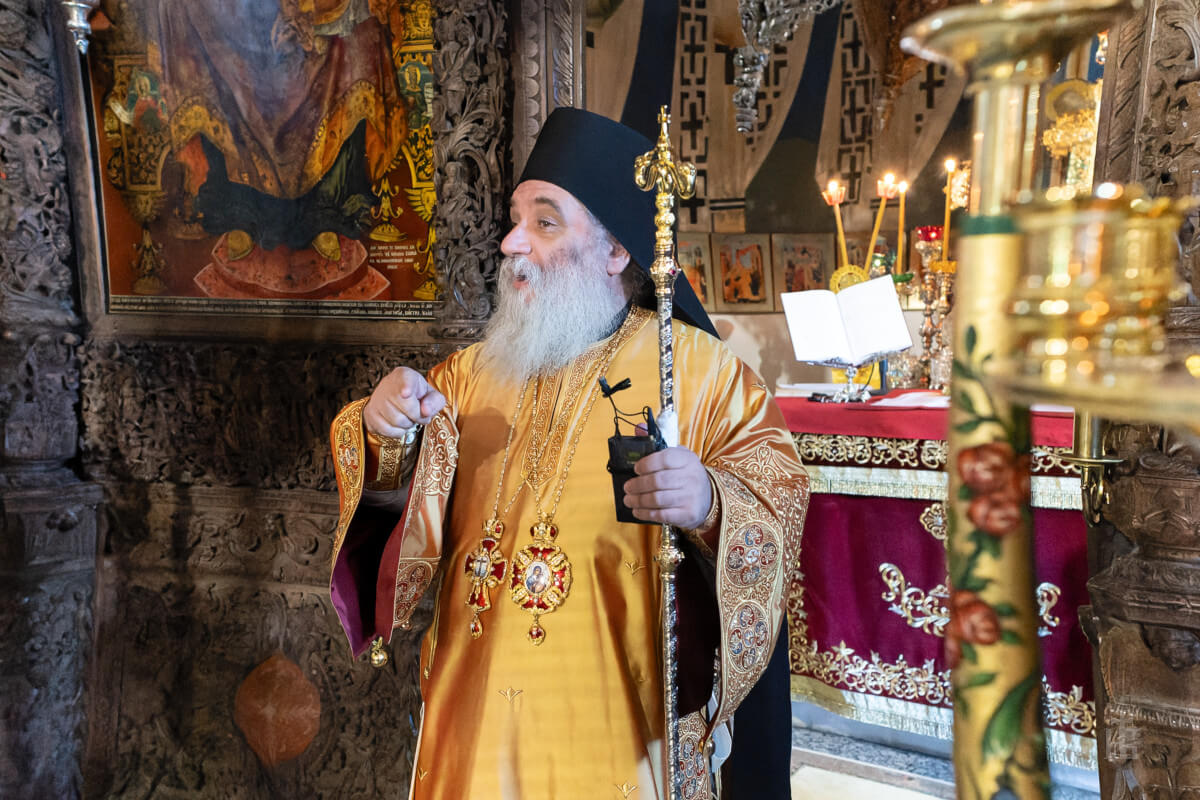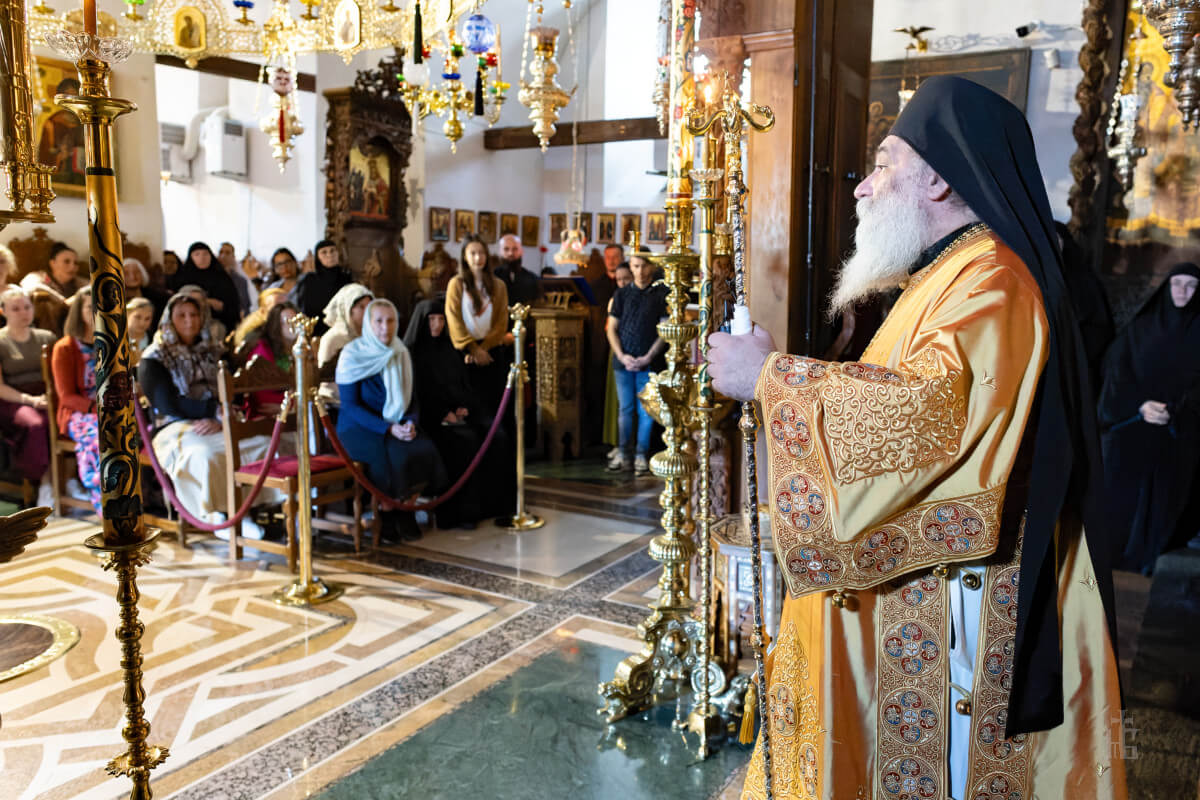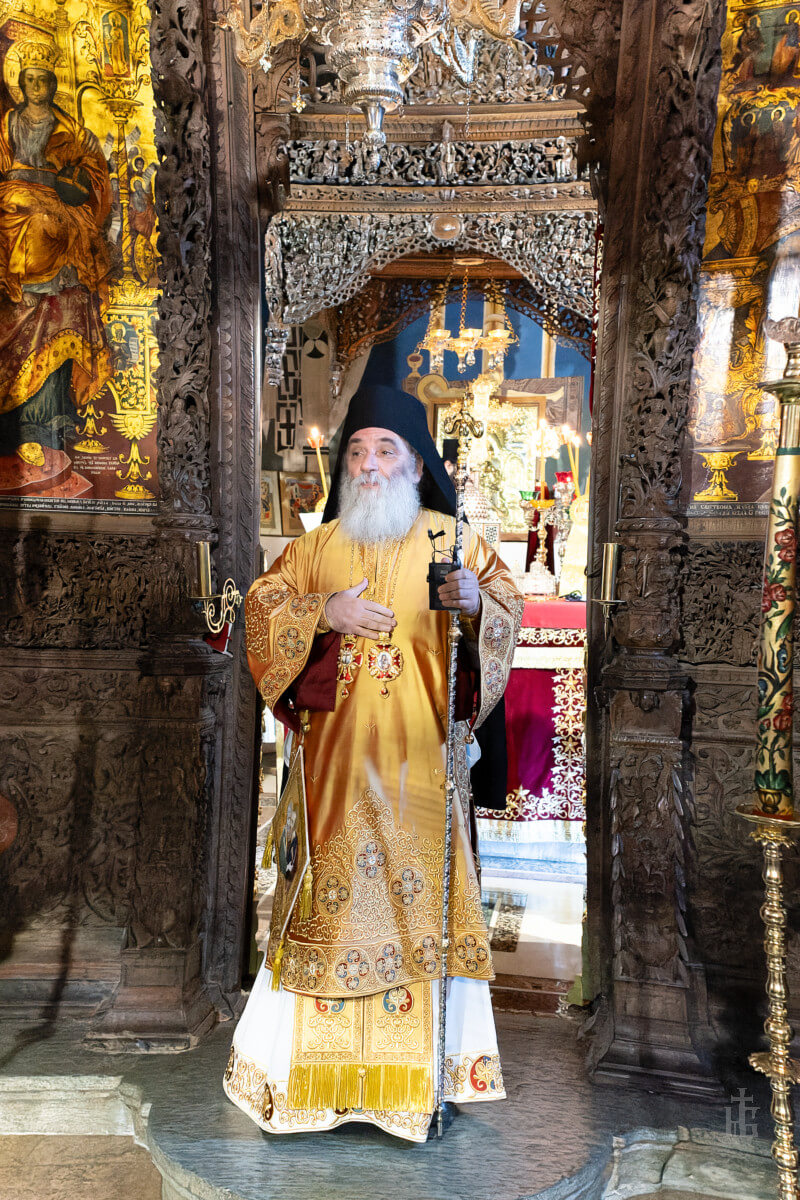Homily by His Grace Bishop Partenij of Antania, delivered during the Divine Liturgy in honor of the Holy Chief Apostles Peter and Paul, on June 29/July 12, 2025, the Year of Our Lord
In the name of the Father, and of the Son, and of the Holy Spirit!
My beloved, in the Symbol of Faith, we confess the Holy Church as apostolic. Why apostolic? Because this is not merely a historical designation, but the very essence of the Church – it is founded upon the faith and witness of the Holy Apostles. In today’s Gospel reading, we heard how the Lord asked His disciples: “Who do men say that I, the Son of Man, am?” With this question, the Lord sought to open their hearts and test the depth of their knowledge. Not because He needed confirmation, but so that He might reveal to them – and to all of us – what true confession of faith means.
The Apostles, as we know, were simple men, most of them unlearned, bearing the marks of ordinary human nature – fishermen, tax collectors, craftsmen. Among them was also the Apostle Peter, whose memory we celebrate today. He and his brother Andrew were fishermen, but of heart meek, sincere, pure, and open to God. And when the Lord asked, “But who do you say that I am?” – Peter responded with a deep and sincere confession: “You are the Christ, the Son of the Living God.” Immediately, the Lord answered him: “Blessed are you, Simon, son of Jonah, for flesh and blood has not revealed this to you, but My Father who is in heaven.”[1]
For, to truly know Christ, human logic, intellect, or education alone are not sufficient. Illumination from above is needed – the heart must be touched by grace, by the Holy Spirit, in order for one to comprehend this great and exalted mystery. And we see proof of this in that same Peter who, after confessing Christ, later in a moment of fear, denied Him. Not because he was evil, but because without the power of grace, man cannot remain firm in the faith. Therefore, the Church always teaches us: everything that is good, everything that is true, is a gift from above.
The preaching of the Apostles is a true miracle in world history. It is powerful, filled with grace. It is a word that gives life, that transforms. Imagine – twelve simple men, without power, without money, without higher education, without institutions behind them – went out into a world full of well-established philosophies, empires, and ideologies, and they conquered the entire world. No philosopher, no thinker of antiquity succeeded in touching the human heart as the Apostles did. The teaching of the Gospel became the foundation of both Western and Eastern civilization. Whether atheists and today’s world accept this or not, it is a historical fact that every virtue, every genuine humanity, every self-sacrificial love is rooted in the teaching of Christ.
We see, beloved, that today’s Europe, which was raised and educated on the foundations of Christian values – something that, whether acknowledged or not, cannot be denied – constantly speaks of coexistence and tolerance among people, regardless of their background, gender, faith, or nation. But this is, in fact, the voice of the Apostle Paul, who declares that in Christ “there is neither Jew nor Greek, neither slave nor free, neither male nor female; for you are all one in Christ Jesus.” From history and from the Holy Scriptures, we know that in the time of Christ, slavery was a generally accepted reality. People were bought and sold like objects. But the Gospel of Christ began to quietly yet profoundly erode that injustice. Many of those who believed in Christ, when they felt the grace and the truth, began to set their slaves free – something previously unimaginable.
Remember Spartacus, the gladiator in ancient Rome, who rose bravely against slavery but failed to change the world. His struggle remained tragic and unfulfilled. Yet the Apostles – those emissaries of Christ – without weapons, without authority, without political power behind them, but filled with the Holy Spirit, succeeded in transforming the human heart, and through it – the entire society. For the apostolic word was not merely one more teaching among many; it was life, love, the Cross, and the Resurrection. Their preaching was confirmed with their blood. The Apostles did not speak of abstractions or ideas – they bore witness to the One whom they had seen, whom they had felt, whom they had touched: the Word of God who took on human flesh, suffered in it, and rose again for the salvation of the world. And when they saw Him alive among the dead, nothing could shake them any longer. They knew: if they died for Him, they would live in Him forever. And so they went out, without fear, into all the world, proclaiming the Risen One. And they changed the world – and are still changing it. Even today, their voice resounds and calls us to receive Christ, to love Him, and through Him, to become children of freedom and of eternity.
Секој човек кој ќе го прими евангелското учење, кој ќе ја прегрне во себе апостолската проповед, започнува да се преобразува. Се менува неговиот ум, се осветлува неговото срце, се просветлува неговиот поглед – се вперува кон она што е вечно, кон Царството Божјо. Таквиот човек не станува само подобар човек, туку станува љубов. Оти, љубовта – вистинската, несебична, распната љубов – беше токму она што апостолите го примија од Христа и што го проповедаа на секое место. Благодатта и силата на нивната проповед беше во тоа што тие ја сведочеа љубовта што ја видоа, што ја почувствуваа, со која се соединија. Тие не говореа само од знаење, туку од живот. Затоа и Господ рече: „Да Те познаат сите“, и „Одете и научете ги сите народи, крштавајќи ги во името на Отецот, и Синот, и СветиотEvery person who receives the Gospel teaching, who embraces within themselves the apostolic preaching, begins to be transformed. Their mind is changed, their heart is sanctified, their gaze is enlightened – it is directed toward what is eternal, toward the Kingdom of God. Such a person does not merely become a better human being; they become love. For love – true, selfless, crucified love – was precisely what the apostles received from Christ and what they preached everywhere. The grace and power of their preaching lay in the fact that they bore witness to the love they had seen, the love they had felt, the love with which they had united themselves. They did not speak merely from knowledge, but from life. That is why the Lord said: “That they may know You,” and “Go therefore and make disciples of all nations, baptizing them in the name of the Father, and of the Son, and of the Holy Spirit.”[2] For the knowledge of God is not an intellectual act, but a union of life – a mysterious interpenetration with Him.
This is precisely what takes place in the Church. Through the Holy Liturgy, through the Holy Mysteries, we are united with Christ. Just as the apostles were united with Him, just as they remained faithful to Him unto death, with the certainty that through suffering they would live. And thereafter, the entire history of the Church is filled with their disciples, with new apostles: Saint Ignatius the God-bearer, Saint Irenaeus of Lyons, Saint Athanasius the Great, Saint Gregory the Theologian… all of them not only preached the Word, but sealed it with their blood.
How powerful is that Word! So powerful that it transforms the human heart, even when what it offers is not comfort, not safety, but the Cross. The Church does not deceive us; it does not offer romanticism, but ascetic struggle and warfare. And we, with trembling, with gratitude, and with resolve, accept that Cross. For Christ foretold to us: “If they persecuted Me, they will also persecute you”[3]; “The time is coming when whoever kills you will think he is offering service to God.”[4] The same holds true today. Once again, the Church of Christ, especially in the East – in Mesopotamia, in Syria – is clothed in the purple of martyrdom. Once again, while the Holy Eucharist is offered, while the prayers of love are being uttered, blood is being shed. New martyrs, new glory, a new triumph of the Lord’s Cross.
Let us not forget: the Cross, persecution, suffering – all of this is a privilege of those who have known and loved Christ. For where there is love, there is also sacrifice. And where there is sacrifice, there already shine the rays of the Resurrection.
The Holy Apostles, beloved, call us to be true Christians – not in name, not by custom, not by habit, but by life, by spirit, by love. Today, sadly, it is difficult to say that many of us who call ourselves Christians truly are so. We have become formalists. We create our own perceptions of Christ, of the Gospel – a Christ that suits our preferences. We are entangled in formalities, in externals, rules, fasts, canons, jurisdictions – but love? It is forgotten.
The Christ of the Gospel, who descended from the heavens, came to forgive, to love, to save humankind. In the faces of the apostles, we see the traits of the entire human race – its weaknesses. How much trust did the Lord place in them! And yet – one betrayed Him, another denied Him, and that one was the most zealous, the most fervent. The rest fled. That is who we humans are. But God did not give up. He embraced them, called them, sent them forth as His messengers, and through them, He transformed the world.
Even today, He calls those who desire to be His, to love Him, to bear witness to Him, to live for Him. When someone truly falls in love with Christ, then they cannot help but speak of Him, cannot help but glorify Him, cannot help but live for Him. Their life becomes a confession of that love. Yes, as human beings we fall, we sin, we have weaknesses – but if we place Him above all, He will never abandon us.
We see that the Lord did not reject the apostles after their fall, but restored them. Peter, who denied Him three times, was asked three times: “Peter, do you love Me?” – not to shame him, but to heal him. And when Peter, grieved, answered the third time, “Lord, You know all things; You know that I love You,” then the Lord entrusted him with His flock: “Feed My sheep.”[5]
oday marks five years since, through the unfathomable mercy of God, I was deemed worthy of the great episcopal rank. I wept then, and I weep now. For the sense of unworthiness does not diminish, but deepens. The higher a person stands in the Church, the greater the temptations become. And I cannot, beloved, say that everything I have done in these five years was good. Many times I stumbled, many times I fell, I sinned. But I have one consolation – the words that Christ addressed to Peter: “Do you love Me?” And truly, sometimes I have nothing else to give Him, nothing else to offer or say to Him, except: “I love You! I love You! I love You, but I have no strength. I do not have the strength to do all that You desire and that I would wish to do for You.” Nothing more.
And then, like the Apostle Paul, I say to myself: “I do the very thing I do not want.”
What a mystery! The Lord Christ restored his dignity through love. And with that same love, He gave him strength to bear the weaknesses of others, to cover their sins, and to lead not with harshness, but with a heart full of forgiveness and compassion. Thus does He build His Church – not upon human righteousness, but upon love. And only through love does the shepherd become a true bearer of the Cross.
But we must not remain in our fall. Christ calls us: “Arise!” – just as He once said to His apostles. Each of us can and must rise. Each one is called. Look at what the first apostles were – simple fishermen. And yet they stood before the sages of the world, before philosophers and kings, and all of them bowed – not to the apostles themselves, but to the grace that illumined them. They were filled with the Holy Spirit, children of the Triune God.
We too, my beloved monks and nuns, are apostles. Everyone who has put on the monastic habit, everyone who has entrusted their life to Christ, is His emissary. What a responsibility, what a fearful dignity! To bear it worthily requires much love, much humility, much repentance. And yet the consolation is great: the Lord, from the most ordinary and simple people, fashioned pillars of the Church. The Apostle Peter – a simple fisherman; the Apostle Paul – a great jurist and teacher of the Jewish tradition. In our time, we might compare him to a distinguished professor of theology. And yet, at first, he persecuted the Truth. Then the Lord appeared to him in a wondrous way, blinded him physically so as to enlighten him spiritually. And in that sacred moment, He asked him: “Saul, Saul, why are you persecuting Me?”[6] – and called him to baptism, to transformation, to sainthood. And he, once a persecutor, became the greatest teacher and preacher of Christ’s Gospel, and in the end, he suffered for Christ. And Peter? He who had denied Christ, in the end asked to be crucified upside down, considering himself unworthy to die in the same manner as his Teacher. Behold, from such people – with weaknesses and falls, but also with great love – God built His Church.
My dear ones, let us love Christ more than anything! Let us love Him with the same love with which the holy apostles loved Him – they who laid down their lives for His sake. And if we love Him in this way, then we too shall become beacons, signposts for others – not only with our words, but with our lives. For the one who lives according to Christ and in Christ, draws others to Him, covering many sins – both his own and those of his neighbors. This is our goal: to live in Christ, to breathe with Him, to be one with Him. And, in saving our own souls, to serve as a bridge for the salvation of others as well.
Through the prayers of the holy and glorious chief apostles Peter and Paul, Lord Jesus Christ, our God, have mercy on us and save us. Amen.
[1] Matthew 16,13-16.
[2] Matthew 28,19.
[3] John 15,20.
[4] John16,2.
[5] John2,15-17.
[6] Acts 9,4.















